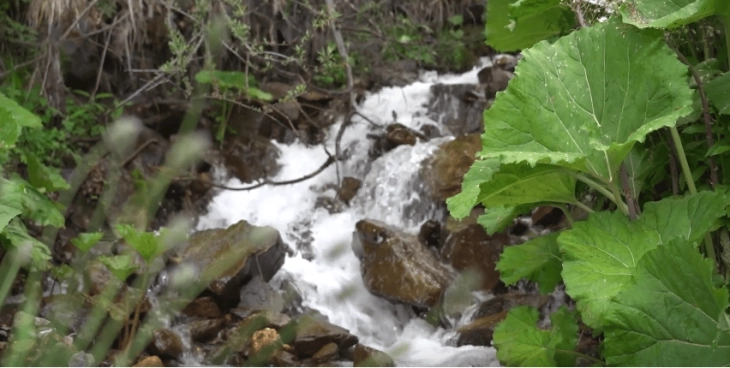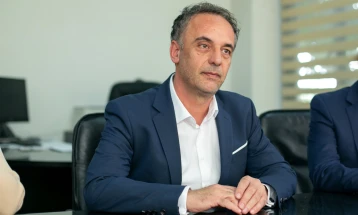River and lake survival rests in the hands of mankind; will we allow the source of life to dry out?

Skopje, 21 July 2021 (MIA) - The art of nature is complete when the blueness of rivers, lakes and seas is overwhelming. That blueness, under the influence of the relentless need of mankind for consumerism, has halved and it’s on its way out. Despite the awareness for the significance of water, the hand of man is drying out water surfaces more and more. Therefore, it seems as though the blueness of nature’s canvas becomes grayness for mankind.
Civil organizations have been sounding the alarm, saying “We need to turn on the red light as soon as possible and take much bigger steps, because the irrational use of natural resources has become an everyday occurrence”.
According to the Ministry of Environment, the main culprits for the reduction of the water levels are climate change, strong anthropogenic pressure, agriculture and invasive species.
 Alongside these factors, the Eco-Awareness Association says there are other factors that worsen things.
“Urbanization increases impermeable surfaces, i.e. the increase of concrete and asphalt structures and decrease of green infrastructure leads to climate disruptions and modifications of surface and underground drainage,” says eco-activist Elena Nikolovska.
Alongside these factors, the Eco-Awareness Association says there are other factors that worsen things.
“Urbanization increases impermeable surfaces, i.e. the increase of concrete and asphalt structures and decrease of green infrastructure leads to climate disruptions and modifications of surface and underground drainage,” says eco-activist Elena Nikolovska.
 She adds that central and local government authorities don’t take the urgency to protect and preserve water resources seriously.
“In times when we face water deficit in the near future, it’s absolutely necessary for water resources to be used for the production of electricity, especially through small hydro-electrical plants. The country has no plan to adapt to climate change that should also include measures to protect water resources,” they say from Eco-Awareness.
A drop of water in the hand, needing to be rescued. Will the water surfaces issues reach us as well?
The state of our country’s three natural lakes is concerning due to their reduction, having moved to a state of reduction instead of increase and stagnation.
She adds that central and local government authorities don’t take the urgency to protect and preserve water resources seriously.
“In times when we face water deficit in the near future, it’s absolutely necessary for water resources to be used for the production of electricity, especially through small hydro-electrical plants. The country has no plan to adapt to climate change that should also include measures to protect water resources,” they say from Eco-Awareness.
A drop of water in the hand, needing to be rescued. Will the water surfaces issues reach us as well?
The state of our country’s three natural lakes is concerning due to their reduction, having moved to a state of reduction instead of increase and stagnation.
 North Macedonia’s National Hydrometeorological Service (NHS) says that this is due to the reduction and drawing of water from the snow reserves, and the temperature increase that was drastic in late June as opposed to the first half of July.
“Our data shows that the temperature increase is due to evaporation from available water surfaces, so we can say that lake evaporation is pretty much the same as the rainfall that falls into lakes, sometimes even greater. Alongside the direct influence on water reserves, there is the indirect influence of using waters, which is also a consequence of increased air temperatures,” the NHS says.
They say that when it comes to using waters for various uses on a yearly level, if it’s uncontrolled then nature can’t make up for the losses.
“Water use per year doesn’t seem that big, but knowing that there’s nowhere to replenish it from, it leads to slowly losing water reserves each year. Similar things have happened in some places of the world, and there is a big lack of water in those places.”
The question is then posed: have we lost our water reserves? Are we in the middle of losing them because nature couldn’t replenish its water reserves due to our mistreatment?
The water sector is the most vulnerable to human activities and climate change
Next to man, climate change is the second greatest enemy of waters. Eco-Awareness says that within the third communication, an estimate was made of how vulnerable water resources are to climate change in the southeastern part of Macedonia, and the official conclusion is that there is a lack of water in the country.
“This year, the latest report for climate change projections and changes to extreme climate events in North Macedonia was made, and it clearly shows that Macedonia will face a warmer, drier climate in the future, and the seriousness of this issue will primarily be related to the future amounts of greenhouse gasses – climate change,” Nikolovska says.
They point out that the country is quickly moving towards desertification, meaning longer periods of drought and heatwaves.
“The current situation is that the world is moving towards an increase of global temperatures of over 3 degrees Celsius, which means that all countries are equally endangered. Developing countries like our own do not have the funds to manage the damages and losses from climate change, so we will suffer the consequences more severely,” the association says.
Regarding the serious lack of water the world is facing, developed and developing countries are actively working on water preservation. In urban areas, catching and redirecting rainwater systems are being installed, even storing it in underground reservoirs for later use, half-permeable tiles on sidewalks and increasing green surfaces are only some of the measures being taken.
“From the experiences being shared in climate conferences, it’s clear that establishing an institutional system for water management is one of the key elements. We must hurry up and bring a national adaptation plan that will secure strong coordination and communication of activities between the central government and municipalities. Municipalities can’t do activities that go against already adopted national plans, and that is the case right now,” Nikolovska says.
We asked nutritionist Fani Guvelevska about the significance of water to human health. Water, she says, not only keeps us alive, but it also protects us from various illnesses.
North Macedonia’s National Hydrometeorological Service (NHS) says that this is due to the reduction and drawing of water from the snow reserves, and the temperature increase that was drastic in late June as opposed to the first half of July.
“Our data shows that the temperature increase is due to evaporation from available water surfaces, so we can say that lake evaporation is pretty much the same as the rainfall that falls into lakes, sometimes even greater. Alongside the direct influence on water reserves, there is the indirect influence of using waters, which is also a consequence of increased air temperatures,” the NHS says.
They say that when it comes to using waters for various uses on a yearly level, if it’s uncontrolled then nature can’t make up for the losses.
“Water use per year doesn’t seem that big, but knowing that there’s nowhere to replenish it from, it leads to slowly losing water reserves each year. Similar things have happened in some places of the world, and there is a big lack of water in those places.”
The question is then posed: have we lost our water reserves? Are we in the middle of losing them because nature couldn’t replenish its water reserves due to our mistreatment?
The water sector is the most vulnerable to human activities and climate change
Next to man, climate change is the second greatest enemy of waters. Eco-Awareness says that within the third communication, an estimate was made of how vulnerable water resources are to climate change in the southeastern part of Macedonia, and the official conclusion is that there is a lack of water in the country.
“This year, the latest report for climate change projections and changes to extreme climate events in North Macedonia was made, and it clearly shows that Macedonia will face a warmer, drier climate in the future, and the seriousness of this issue will primarily be related to the future amounts of greenhouse gasses – climate change,” Nikolovska says.
They point out that the country is quickly moving towards desertification, meaning longer periods of drought and heatwaves.
“The current situation is that the world is moving towards an increase of global temperatures of over 3 degrees Celsius, which means that all countries are equally endangered. Developing countries like our own do not have the funds to manage the damages and losses from climate change, so we will suffer the consequences more severely,” the association says.
Regarding the serious lack of water the world is facing, developed and developing countries are actively working on water preservation. In urban areas, catching and redirecting rainwater systems are being installed, even storing it in underground reservoirs for later use, half-permeable tiles on sidewalks and increasing green surfaces are only some of the measures being taken.
“From the experiences being shared in climate conferences, it’s clear that establishing an institutional system for water management is one of the key elements. We must hurry up and bring a national adaptation plan that will secure strong coordination and communication of activities between the central government and municipalities. Municipalities can’t do activities that go against already adopted national plans, and that is the case right now,” Nikolovska says.
We asked nutritionist Fani Guvelevska about the significance of water to human health. Water, she says, not only keeps us alive, but it also protects us from various illnesses.
 “To remain healthy, we should drink around 2 liters of water a day. That amounts to around 60,000 liters of water in a lifetime because the average lifespan is 79 years. Staying hydrated can also help prevent cancer, because hydration is key to blood circulation which helps immune cells reach damaged tissues in higher numbers,” she says.
Unfortunately, the associations’ expectations for water preservation are that the prolonged droughts in the future will cause huge damages and losses for agriculture which will make the growing of certain traditional produce impossible due to the high water demands of those cultures.
The importance of water and our responsibility to preserve it only becomes greater when we taken into account that the human body is comprised of 70% water, and it’s the primary element on our planet as well. We are water, and if there’s no water, there’s no us either.
https://youtu.be/ZFFK5IVNcBc
Simona Srbinoska
Videos by Andrej Brankovikj
Translated by Dragana Knezhevikj
By publishing this story, MIA joins the Get Your Head Cleared campaign, as implemented by the Institute of Communication Studies and funded by the British Embassy in Skopje
“To remain healthy, we should drink around 2 liters of water a day. That amounts to around 60,000 liters of water in a lifetime because the average lifespan is 79 years. Staying hydrated can also help prevent cancer, because hydration is key to blood circulation which helps immune cells reach damaged tissues in higher numbers,” she says.
Unfortunately, the associations’ expectations for water preservation are that the prolonged droughts in the future will cause huge damages and losses for agriculture which will make the growing of certain traditional produce impossible due to the high water demands of those cultures.
The importance of water and our responsibility to preserve it only becomes greater when we taken into account that the human body is comprised of 70% water, and it’s the primary element on our planet as well. We are water, and if there’s no water, there’s no us either.
https://youtu.be/ZFFK5IVNcBc
Simona Srbinoska
Videos by Andrej Brankovikj
Translated by Dragana Knezhevikj
By publishing this story, MIA joins the Get Your Head Cleared campaign, as implemented by the Institute of Communication Studies and funded by the British Embassy in Skopje
 Alongside these factors, the Eco-Awareness Association says there are other factors that worsen things.
“Urbanization increases impermeable surfaces, i.e. the increase of concrete and asphalt structures and decrease of green infrastructure leads to climate disruptions and modifications of surface and underground drainage,” says eco-activist Elena Nikolovska.
Alongside these factors, the Eco-Awareness Association says there are other factors that worsen things.
“Urbanization increases impermeable surfaces, i.e. the increase of concrete and asphalt structures and decrease of green infrastructure leads to climate disruptions and modifications of surface and underground drainage,” says eco-activist Elena Nikolovska.
 She adds that central and local government authorities don’t take the urgency to protect and preserve water resources seriously.
“In times when we face water deficit in the near future, it’s absolutely necessary for water resources to be used for the production of electricity, especially through small hydro-electrical plants. The country has no plan to adapt to climate change that should also include measures to protect water resources,” they say from Eco-Awareness.
A drop of water in the hand, needing to be rescued. Will the water surfaces issues reach us as well?
The state of our country’s three natural lakes is concerning due to their reduction, having moved to a state of reduction instead of increase and stagnation.
She adds that central and local government authorities don’t take the urgency to protect and preserve water resources seriously.
“In times when we face water deficit in the near future, it’s absolutely necessary for water resources to be used for the production of electricity, especially through small hydro-electrical plants. The country has no plan to adapt to climate change that should also include measures to protect water resources,” they say from Eco-Awareness.
A drop of water in the hand, needing to be rescued. Will the water surfaces issues reach us as well?
The state of our country’s three natural lakes is concerning due to their reduction, having moved to a state of reduction instead of increase and stagnation.
 North Macedonia’s National Hydrometeorological Service (NHS) says that this is due to the reduction and drawing of water from the snow reserves, and the temperature increase that was drastic in late June as opposed to the first half of July.
“Our data shows that the temperature increase is due to evaporation from available water surfaces, so we can say that lake evaporation is pretty much the same as the rainfall that falls into lakes, sometimes even greater. Alongside the direct influence on water reserves, there is the indirect influence of using waters, which is also a consequence of increased air temperatures,” the NHS says.
They say that when it comes to using waters for various uses on a yearly level, if it’s uncontrolled then nature can’t make up for the losses.
“Water use per year doesn’t seem that big, but knowing that there’s nowhere to replenish it from, it leads to slowly losing water reserves each year. Similar things have happened in some places of the world, and there is a big lack of water in those places.”
The question is then posed: have we lost our water reserves? Are we in the middle of losing them because nature couldn’t replenish its water reserves due to our mistreatment?
The water sector is the most vulnerable to human activities and climate change
Next to man, climate change is the second greatest enemy of waters. Eco-Awareness says that within the third communication, an estimate was made of how vulnerable water resources are to climate change in the southeastern part of Macedonia, and the official conclusion is that there is a lack of water in the country.
“This year, the latest report for climate change projections and changes to extreme climate events in North Macedonia was made, and it clearly shows that Macedonia will face a warmer, drier climate in the future, and the seriousness of this issue will primarily be related to the future amounts of greenhouse gasses – climate change,” Nikolovska says.
They point out that the country is quickly moving towards desertification, meaning longer periods of drought and heatwaves.
“The current situation is that the world is moving towards an increase of global temperatures of over 3 degrees Celsius, which means that all countries are equally endangered. Developing countries like our own do not have the funds to manage the damages and losses from climate change, so we will suffer the consequences more severely,” the association says.
Regarding the serious lack of water the world is facing, developed and developing countries are actively working on water preservation. In urban areas, catching and redirecting rainwater systems are being installed, even storing it in underground reservoirs for later use, half-permeable tiles on sidewalks and increasing green surfaces are only some of the measures being taken.
“From the experiences being shared in climate conferences, it’s clear that establishing an institutional system for water management is one of the key elements. We must hurry up and bring a national adaptation plan that will secure strong coordination and communication of activities between the central government and municipalities. Municipalities can’t do activities that go against already adopted national plans, and that is the case right now,” Nikolovska says.
We asked nutritionist Fani Guvelevska about the significance of water to human health. Water, she says, not only keeps us alive, but it also protects us from various illnesses.
North Macedonia’s National Hydrometeorological Service (NHS) says that this is due to the reduction and drawing of water from the snow reserves, and the temperature increase that was drastic in late June as opposed to the first half of July.
“Our data shows that the temperature increase is due to evaporation from available water surfaces, so we can say that lake evaporation is pretty much the same as the rainfall that falls into lakes, sometimes even greater. Alongside the direct influence on water reserves, there is the indirect influence of using waters, which is also a consequence of increased air temperatures,” the NHS says.
They say that when it comes to using waters for various uses on a yearly level, if it’s uncontrolled then nature can’t make up for the losses.
“Water use per year doesn’t seem that big, but knowing that there’s nowhere to replenish it from, it leads to slowly losing water reserves each year. Similar things have happened in some places of the world, and there is a big lack of water in those places.”
The question is then posed: have we lost our water reserves? Are we in the middle of losing them because nature couldn’t replenish its water reserves due to our mistreatment?
The water sector is the most vulnerable to human activities and climate change
Next to man, climate change is the second greatest enemy of waters. Eco-Awareness says that within the third communication, an estimate was made of how vulnerable water resources are to climate change in the southeastern part of Macedonia, and the official conclusion is that there is a lack of water in the country.
“This year, the latest report for climate change projections and changes to extreme climate events in North Macedonia was made, and it clearly shows that Macedonia will face a warmer, drier climate in the future, and the seriousness of this issue will primarily be related to the future amounts of greenhouse gasses – climate change,” Nikolovska says.
They point out that the country is quickly moving towards desertification, meaning longer periods of drought and heatwaves.
“The current situation is that the world is moving towards an increase of global temperatures of over 3 degrees Celsius, which means that all countries are equally endangered. Developing countries like our own do not have the funds to manage the damages and losses from climate change, so we will suffer the consequences more severely,” the association says.
Regarding the serious lack of water the world is facing, developed and developing countries are actively working on water preservation. In urban areas, catching and redirecting rainwater systems are being installed, even storing it in underground reservoirs for later use, half-permeable tiles on sidewalks and increasing green surfaces are only some of the measures being taken.
“From the experiences being shared in climate conferences, it’s clear that establishing an institutional system for water management is one of the key elements. We must hurry up and bring a national adaptation plan that will secure strong coordination and communication of activities between the central government and municipalities. Municipalities can’t do activities that go against already adopted national plans, and that is the case right now,” Nikolovska says.
We asked nutritionist Fani Guvelevska about the significance of water to human health. Water, she says, not only keeps us alive, but it also protects us from various illnesses.
 “To remain healthy, we should drink around 2 liters of water a day. That amounts to around 60,000 liters of water in a lifetime because the average lifespan is 79 years. Staying hydrated can also help prevent cancer, because hydration is key to blood circulation which helps immune cells reach damaged tissues in higher numbers,” she says.
Unfortunately, the associations’ expectations for water preservation are that the prolonged droughts in the future will cause huge damages and losses for agriculture which will make the growing of certain traditional produce impossible due to the high water demands of those cultures.
The importance of water and our responsibility to preserve it only becomes greater when we taken into account that the human body is comprised of 70% water, and it’s the primary element on our planet as well. We are water, and if there’s no water, there’s no us either.
https://youtu.be/ZFFK5IVNcBc
Simona Srbinoska
Videos by Andrej Brankovikj
Translated by Dragana Knezhevikj
By publishing this story, MIA joins the Get Your Head Cleared campaign, as implemented by the Institute of Communication Studies and funded by the British Embassy in Skopje
“To remain healthy, we should drink around 2 liters of water a day. That amounts to around 60,000 liters of water in a lifetime because the average lifespan is 79 years. Staying hydrated can also help prevent cancer, because hydration is key to blood circulation which helps immune cells reach damaged tissues in higher numbers,” she says.
Unfortunately, the associations’ expectations for water preservation are that the prolonged droughts in the future will cause huge damages and losses for agriculture which will make the growing of certain traditional produce impossible due to the high water demands of those cultures.
The importance of water and our responsibility to preserve it only becomes greater when we taken into account that the human body is comprised of 70% water, and it’s the primary element on our planet as well. We are water, and if there’s no water, there’s no us either.
https://youtu.be/ZFFK5IVNcBc
Simona Srbinoska
Videos by Andrej Brankovikj
Translated by Dragana Knezhevikj
By publishing this story, MIA joins the Get Your Head Cleared campaign, as implemented by the Institute of Communication Studies and funded by the British Embassy in Skopje 






